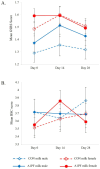A1 protein free milk benefits mood and subjective cognition in free-living Australian adults: a pragmatic, exploratory, open label randomised controlled trial
- PMID: 40529420
- PMCID: PMC12170308
- DOI: 10.3389/fnut.2025.1579986
A1 protein free milk benefits mood and subjective cognition in free-living Australian adults: a pragmatic, exploratory, open label randomised controlled trial
Abstract
Background: Adverse effects of milk containing A1-type β-casein on digestion, immune response, and cognition have been identified in milk-intolerant individuals, but health effects in healthy individuals without symptoms of milk intolerance are yet to be examined.
Objective: The objective was to explore the impact of reducing A1 type β-casein intake via switching milk type from conventional A1/A2-type β-casein milk (A1/A2 milk) to A1-type β-casein protein free milk (A1PF) on brain, immune response, gastrointestinal, and skin (BIGS) outcomes in a real-world setting.
Methods: An open-label, pragmatic, exploratory randomised controlled trial was conducted in 997 healthy, free-living Australian older adolescents and adults (16-65 years) who regularly consume A1/A2 protein-containing milk and milk products. Participants were randomised into two groups, to consume ≥250 mL/day of A1/A2 milk (control) or to switch to ≥250 mL/day of A1PF milk (intervention) for 28 days, while continuing to follow their usual diet (including up to 1 serve a day of A1/A2 dairy products). A sub-group of 265 participants conducted stool, saliva and cognitive testing on days 0 and 28. All participants completed subjective questionnaires on days 0, 14, and 28.
Results: No differences in gut microbiome composition, alpha-diversity, or function were found by switching milk type. After switching to A1PF milk, a small increase in stool consistency was reported (-0.16, p = 0.007), and females experienced a marginal reduction in gastrointestinal symptoms (p = 0.015) and improved subjective cognition (p = 0.03). Switching to A1PF milk reduced anxiety (-0.61; p = 0.002), depression (-0.56; p = 0.023), stress (-0.70, p = 0.012) and fatigue (p = 0.001; females only), compared to drinking A1/A2 milk, with stronger effects in females. No consistent effects on markers of immune response or skin health were identified.
Conclusion: Switching from conventional A1/A2 milk to A1PF milk may benefit mood and subjective cognition, particularly in females, without the need for complete elimination of A1 β-casein from the diet. Further investigations are warranted.
Clinical trial registration: https://www.anzctr.org.au/Trial/Registration/TrialReview.aspx?id=385966, identifier ACTRN12623000628640.
Keywords: A1 protein free milk; brain health; gastrointestinal microbiome; gut-brain axis; mental health; mood; pragmatic clinical trial; β-casein.
Copyright © 2025 Starck, Blumfield, Petocz, Duve, Downey, Abbott and Fayet-Moore.
Conflict of interest statement
Authors independently work for FOODiQ Global, which gains funding for projects from government, not-for-profits, professional, community, and industry organisations. PP is an independent statistical consultant to FOODiQ Global.
Figures






Similar articles
-
Milk free of A1 β-casein supports superior gains in cognition and quality of life, relative to conventional milk, in older adults with mild cognitive impairment.J Nutr Health Aging. 2025 Jul;29(7):100579. doi: 10.1016/j.jnha.2025.100579. Epub 2025 May 14. J Nutr Health Aging. 2025. PMID: 40373392 Free PMC article. Clinical Trial.
-
Lactase-Treated A2 Milk as a Feasible Conventional Milk Alternative: Results of a Randomized Controlled Crossover Trial to Assess Tolerance, Gastrointestinal Distress, and Preference for Milks Varying in Casein Types and Lactose Content.Nutrients. 2025 Jun 6;17(12):1946. doi: 10.3390/nu17121946. Nutrients. 2025. PMID: 40573057 Free PMC article. Clinical Trial.
-
Effect of Infant Formula Made With Milk Free of A1-Type β-Casein on Growth and Comfort: A Randomized Controlled Trial.Food Sci Nutr. 2025 Jul 15;13(7):e70606. doi: 10.1002/fsn3.70606. eCollection 2025 Jul. Food Sci Nutr. 2025. PMID: 40672544 Free PMC article.
-
Prenatal administration of progestogens for preventing spontaneous preterm birth in women with a multiple pregnancy.Cochrane Database Syst Rev. 2019 Nov 20;2019(11):CD012024. doi: 10.1002/14651858.CD012024.pub3. Cochrane Database Syst Rev. 2019. PMID: 31745984 Free PMC article.
-
Assessing the comparative effects of interventions in COPD: a tutorial on network meta-analysis for clinicians.Respir Res. 2024 Dec 21;25(1):438. doi: 10.1186/s12931-024-03056-x. Respir Res. 2024. PMID: 39709425 Free PMC article. Review.
References
-
- Suchy FJ, Brannon PM, Carpenter TO, Fernandez JR, Gilsanz V, Gould JB, et al. NIH consensus development conference statement: lactose intolerance and health. NIH Consens State Sci Statements. (2010) 27:1–27. PMID: - PubMed
LinkOut - more resources
Full Text Sources

